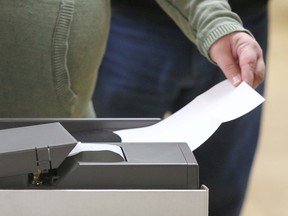The government’s announcement about Bill 20 is titled “Strengthening local elections and councils” but a lot of what follows doesn’t supports this.
Article content
In politics, it can be difficult to get everyone from different points of view to agree about much — but there’s surely no disputing the Alberta UCP government’s proficiency in newspeak.
Advertisement 2
Article content
The province has outdone itself again, this time with Bill 20 and its proposed changes to rules governing municipalities, unveiled last week.
Article content
Its announcement was titled “Strengthening local elections and councils.”
It continued: “Bill 20 would set new rules for local elections and councils to enhance integrity and maintain public trust.”
Sounds lovely … except a lot of what follows doesn’t supports those statements.
Requiring criminal record checks sound great, unless a candidate with some kind of dubious history was never charged and convicted of a crime.
Prohibiting the use of electronic vote tabulators and other automated voting equipment is a response to a problem we don’t have.
There have been no proven instances of massive fraud or impropriety with vote tabulators in Canada.
Article content
Advertisement 3
Article content
The last local visits to the ballot box have shown voting machines count more quickly and probably more accurately than humans do — and in the case of doubt or mechanical fault, we can always fall back on counting the paper ballots.
Slow, tedious vote counts are a bigger threat to integrity and public trust, I would argue.
Allowing political donations all the time and allowing them from unions and corporate donors would bring the big money forever-campaign of provincial and federal politics to cities, which would be an unwelcome change.
Meanwhile, giving the provincial cabinet the authority to require a town or city to amend or repeal a bylaw is an alarming proposition.
Through all the COVID-19 drama, we already know cabinet conversations are confidential.
Advertisement 4
Article content
We only have the word of cabinet ministers that a piece of city legislation is so terrible in their eyes that it has to be changed or invalidated … but at the end of the day, due to cabinet confidentiality, electors will never know exactly why such a decision came to be.
Not exactly the paragon of transparency and accountability with respect to the people.

Meanwhile, allowing political parties at the city level makes elected officials more accountable to their leader and affiliated power brokers than it does to electors.
Some have pointed out that there tend to be voting blocks on councils, which is a fair point, but those blocks aren’t permanent.
You’ve seen Calgary city council quickly rearrange itself in the debate ahead of Calgary’s defunct bid for the 2026 Winter Olympics, or to repeal its unworkable single-use items bylaw when things didn’t turn out the way they were supposed to.
Advertisement 5
Article content
I can’t imagine anything like that happening if council members were beholden to a leader or anyone else who could be exerting influence and moral suasion in the wings.
Political parties for cities could also make life way easier for lobbyists. They’d only have to reach the ear of a party leader, instead of having to persuade a majority of council members.
It could also make life too easy for council members themselves, who would likely just do what their leader tells them instead of having to understand what’s happening and choose to do what’s right.
For all of my misgivings, Bill 20 isn’t a complete waste.
The idea of limiting donations to third-party advertisers is intriguing. Depending on how this is implemented, it could be a positive change.
Advertisement 6
Article content
When it comes to cities trying to do the province’s work during a public health emergency, clarity on the matter can’t hurt.
As for allowing the provincial cabinet to remove councillors, this is something that can already be done when necessary — and we’ve seen it happen in recent times. (See the province’s response to shenanigans in Chestermere.)
But on the whole, the worst thing about Bill 20 is that while it purports to strengthen local councils, it would in practice take away from electors’ rights and expectations by allowing the province to unilaterally override the actions of the officials people chose to send to city and town halls.
It’s as if the provincial government were saying voters can’t be trusted. Imagine that.
Article content


